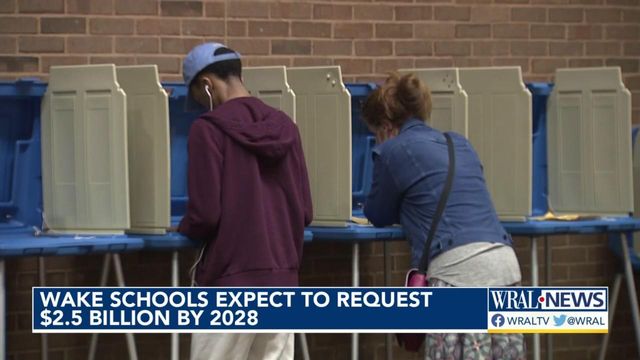Wake schools expect bond referendum, needing $2.5 billion for facilities by 2028
Wake County voters will likely see another bond referendum on the ballot this fall - and the Wake County School Board is hoping to be part of it. The school board says it still needs $2.5 billion more for capital projects by 2028, most of which isn't funded.
Posted — UpdatedThe Wake County Public School System plans to ask for a school bond referendum this fall, but to do so, they need approval from the Wake County Board of Commissioners, who will meet with the school board later this month to discuss budget needs – including whether to put more school construction bonds on the ballot this fall.
Wake County voters have seen a lot of school bonds in the past few years. In 2013, they approved $810 million dollars for school construction. Then, in 2018, they okayed another $548 million. That adds up to $1.36 billion dollars in less than a decade.
The school board says lists $2.5 billion in capital costs through 2028, and only this year and next year are so far funded. It's not clear how much isn't funded.
Wake County Schools Chief business officer David Neter explained the board could ask county commissioners to include school construction in their bond referendum planned for November.
“Because we're currently in a county where parts are growing rapidly, more rapidly than others, even though our student counts aren't growing significantly, we're still having to open new schools to accommodate the growth in those areas,” Neter said.
It’s not clear yet how much the school board will ask for or whether it will cause a tax increase. Ultimately, it’s up to county commissioners to decide which bonds to put on the ballot and for how much. They could also find other ways to cover some of the cost, like cash reserves, or limited bonds that don’t have to go on the ballot.
The bond would be exclusively for capital improvement projects, according to Neter. It would not be used for pay increases.
However, Neter also told the board the district was facing a “fiscal cliff” because of pay raises the board recently approved for the lowest-paid school staff and employees the district had hired using temporary money. That could necessitate an additional request to the county for an increase in operating funds.
The district has used $35 million in temporary federal COVID-19 funds to hire more school counselors and school social workers to provide students with more support for needs that may have been exacerbated by the pandemic’s impact on learning and mental health.
“We intend to keep the employees even after funding goes away,” said Neter.
Several board members mentioned students' mental health as reasons to maintain those employees.
The school board needs to be clear why those employees are needed, board member Jim Martin said.
"We don’t need that money today, but we’re sure going to need it two years down the road," Martin said.
The district is also short $13 million next year in pay raises for employees to at least $15 per hour. While the state plans to fund all positions at at least $15 per hour next year, the district has many employees who were paid below that until recently who are locally funded employees.
Part of the $13 million is also because the district adjusted funding for hourly employees affected by the wage change to avoid “step compression.” Step compression happens when lifting up the lowest wage for the least experienced people causes more experienced people to be paid the same wage, instead of compensated for their experience. The new state budget does not address step compression. So the district increased wages for more experienced employees to avoid them being paid the same as someone just starting out.
Complicating all this is the fact that the entire school board and the entire board of county commissioners is up for re-election this fall – and that could make anything that would raise taxes a tough sell.
Related Topics
• Credits
Copyright 2024 by Capitol Broadcasting Company. All rights reserved. This material may not be published, broadcast, rewritten or redistributed.





